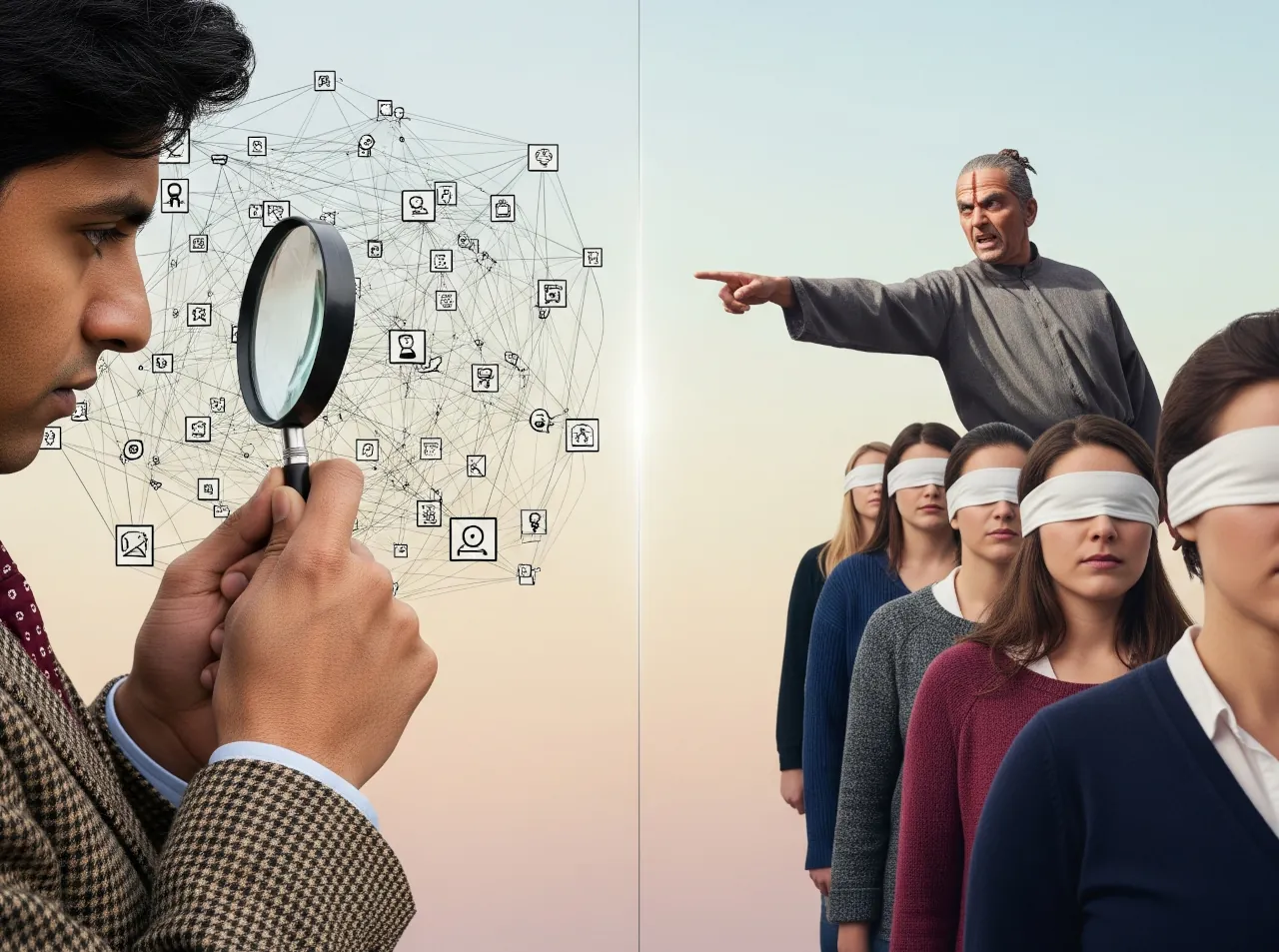WHY ARE WE SO SURE WE (DON'T) BELIEVE IN CONSPIRACIES? THE FINE LINE BETWEEN SKEPTICISM AND SELECTIVE IGNORANCE.

We live in an age of information (and disinformation), where every major event seems to come bundled with a multitude of alternative explanations. From the moon landing to recent political events, “official” narratives are often challenged by what we generically call conspiracy theories. The way we react to these is often polarized: either we dismiss any unconventional idea as absurd from the outset, or we fervently accept any theory, no matter how fanciful. But where does the truth lie, and how do our own biases influence our perception?
The Two Extremes: Blind Rejection vs. Unconditional Acceptance
On one hand, we have the “Absolute Skeptic.” This person categorically rejects any conspiracy theory, often before even analyzing it. The argument is simple: “They’re nonsense, inventions for the naive.” For them, the idea that small groups could manipulate large-scale events is simply inconceivable. This is healthy skepticism, but when taken to the extreme, it becomes selective ignorance. The refusal to investigate, to ask uncomfortable questions, or to consider atypical scenarios, even when there are discrepancies in the official narrative, can be just as dangerous as gullibility. History is full of “conspiracy theories” that turned out to be true (e.g., Project MKUltra, the Watergate Scandal, covert government operations).
On the other hand, we have the “Fervent Believer.” This person is ready to accept almost any alternative explanation, especially if it strongly contradicts the official narrative. For them, every event is proof of a larger, deeper conspiracy. This type of thinking can offer a sense of control (I know “the truth”) or intellectual superiority (I am “woke”). However, a lack of discernment, the unconditional acceptance of thin or even contradictory evidence, and the refusal to critique sources lead to a distorted reality, populated by imaginary monsters and absurd plots.
Why Are We Here? The Psychology Behind It
Our behavior towards conspiracy theories is not just a matter of intelligence, but also of deep psychology:
- Need for Control and Explanation: When major and chaotic events occur (pandemics, economic crises, terrorist acts), the human mind seeks explanations and a sense of control. A conspiracy, however dark, offers an orderly explanation and an identifiable cause, unlike senseless chaos.
- Confirmation Bias: We have a natural tendency to seek out and interpret information in a way that confirms our existing beliefs. If we believe the “system” is corrupt, we’ll find evidence everywhere. If we believe everything is random, we’ll ignore patterns.
- Sense of Belonging: Being part of a group that “knows the truth” offers a strong sense of community and identity, especially in an increasingly fragmented world.
- Lack of Trust in Authorities: Years of scandals, lies, and failures from institutions (governments, media, corporations) have fundamentally eroded public trust. This vacuum of trust is often filled by alternative narratives.
Finding the Truth: Beyond Simplifications
Truth is rarely simple or comfortable. It often lies in a gray area, far from the extremes. To navigate this complex landscape effectively, it’s essential to cultivate authentic discernment:
- Ask Questions, But Don’t Cling to Answers: Being skeptical means questioning, not dismissing outright. But once you’ve investigated, be prepared to accept that the answer may be complex or even different from what you expected.
- Verify Sources, Not Just Headlines: Before sharing information, check who is saying it and why. Look for evidence, not just claims. Who benefits from the spread of that information?
- Seek Coherence, Not Sensationalism: A “true” conspiracy theory (i.e., a real plot) will be based on solid evidence, documents, and consistent testimonies. Many fanciful theories rely on weak connections and circular logic.
- Be Open to Change: Recognize that your own perception is filtered by experiences and biases. Be willing to change your mind in light of new evidence.
The line between healthy skepticism and selective ignorance is often finer than we think. So is the line between a legitimate investigation of a real plot and a wandering into unfounded fantasies. The challenge is not to believe or not believe in conspiracies, but to become a fearless, yet rational, truth-seeker, capable of discerning reality beyond the noise.
How do you approach “conspiracy theories”? What strategy do you use to distinguish between what’s plausible and what’s pure fiction?